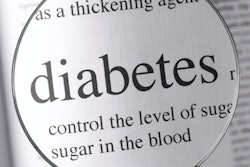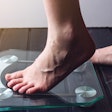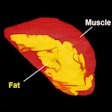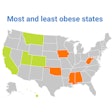SAN FRANCISCO - Patients who are obese or overweight are more likely to have periodontitis, according to a study by U.K. researchers. They presented their findings from a case-control study of nearly 300 patients in a poster presentation at the American Academy of Periodontology's (AAP) 100th Annual Meeting.
Evidence has been published that suggests an association between overweight or obese patients and periodontitis, noted lead author Jeanie Suvan, the clinical trials coordinator in the department of restorative dental sciences at the University College London (UCL) Eastman Dental Institute Faculty of Medical Sciences, and colleagues. These are two chronic diseases with multiple factors implicated in their onset and progression.
To learn more about this association, the researchers recruited patients from the UCL Eastman Dental Hospital Unit of Periodontology for case patients and from the institution's restorative dentistry program to serve as control patients. The study included 286 patients: 143 case patients and the same number of controls. More women than men were in each group, and participants were mostly Caucasian or Asian. A majority of the participants were nonsmokers (55.2% of case patients, 65.7% of control patients) or former smokers (25.9% and 18.9%, respectively). The average age was the same in each group and ranged from 25 to 66 years.
The majority of patients in the control group were classified as underweight or normal weight (67.1%), but in the case study group, 43.4% of patients were classified as normal or underweight, while 36.4% were classified as overweight and 20.3% classified as obese. The average body mass index (BMI) in the control group was 24.24, while in the case study group, it was more than two points higher at 26.52.
The researchers determine periodontal status for each patient by measuring whole-mouth pocket depths, recession, bleeding on probing, and plaque levels (six sites per tooth).
They found that, on average, the case study group had slightly fewer teeth (27.90 versus 28.51) and a lower full-mouth plaque score (45.49 versus 52.36). They also found that the case study group had higher full-mouth bleeding score (52.79 versus 20.61) and almost double the periodontal probing depth (3.80 versus 1.99).
The estimated odds ratio for having periodontitis if an individual was overweight was 2.56 (95% confidence interval [CI] 1.210 to 5.400, p = 0.014) and for an obese individual was 3.11 (95% CI 1.052 to 6.481, p = 0.015) compared with a normal BMI. The researchers found that patients with a BMI of 24.32 or higher were 1.6 times more likely to have a diagnosis of periodontitis.
"Overweight and obese individuals are more likely to suffer from periodontitis compared to normal-weight individuals," independent of dental plaque levels and other common risk factors, the authors concluded.


















